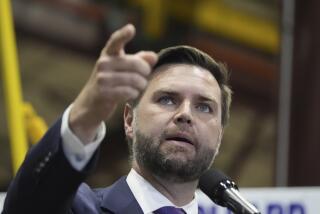Baker Lauds Bush’s Plan for ‘Flexible’ Budget Freeze
- Share via
WASHINGTON — Vice President George Bush’s idea of a “flexible freeze” budget plan to pay for new programs without raising taxes won praise Sunday from James A. Baker III, who is resigning as Treasury secretary to take command of Bush’s presidential campaign.
“We here in Washington cannot resist the temptation to spend the people’s money on new programs, and when we raise taxes it does not go to deficit reduction,” Baker said during an interview televised on NBC’s “Meet the Press.”
New proposals from Bush, such as a child care program and reduction of the capital gains tax, can be supported without tax increases, Baker said, by transferring funds under Bush’s “flexible freeze” concept. The approach, less rigid than the Gramm-Rudman budget law now in force, envisions a five-year plan that would permit changes in allocations to specific programs as long as the over-all budget was balanced. Bush has declined to itemize potential spending cuts.
Keyed to Interest Rates
The “flexible freeze” approach is based partly on hope that interest rates will take a downward trend as the economy expands, so that money now earmarked for interest will be available for other purposes. Baker avoided speculation in this area when he was asked if the Bush camp was concerned about congressional testimony last month from Federal Reserve Board Chairman Alan Greenspan, who said that too-rapid economic growth may lead to another increase in interest rates in order to head off a new round of inflation.
Although Greenspan told the Senate Banking Committee that the Fed intends to “err on the side of restrictiveness” to curb inflation, Baker said the board had not signaled an increase in rates.
“I think the Federal Reserve has done an extraordinarily good job of maintaining the balance between preserving growth on the one hand and being vigilant against inflation on the other,” Baker said. He called the question of a rate increase “hypothetical.”
In the political area that will be his province in a few days, Baker left most questions open, pending Bush’s nomination at the Republican National Convention next week in New Orleans. He ducked speculation on Bush’s choice of a running mate and avoided a specific commitment when asked whether the GOP candidate would debate the Democratic presidential nominee, Massachusetts Gov. Michael S. Dukakis.
Debate Pact Cited
Reminded that the chairmen of both parties announced a year ago that all presidential contenders agreed that, if nominated, they would take part in three party-sponsored debates, Baker said that Frank J. Fahrenkopf Jr., the GOP chairman, was “not empowered to commit the party’s nominee.”
Baker added, however, that “the vice president looks forward to debating Gov. Dukakis. He will debate Gov. Dukakis.”
Asked whether there will be three debates, Baker said only: “There will be debates.”
He discounted reports that some Bush aides were worried that Dukakis might better Bush in debate, saying that during the primary campaign Bush “blew the opposition away in those debates.”
Bush on Sunday agreed to debate Dukakis more than once, but would not be more specific. From his home in Maine, Bush, attempting to dispel any perception that he is unwilling to confront his rival, said: “Not only do I want debates, but I have to, because I’ve got to get him to stand by his record.”
Reminded of the results of last week’s Wall Street Journal-NBC poll, showing that 46% of voters had an unfavorable impression of Bush and 44% had a favorable impression, Baker conceded that “there are a large number of unfavorables out there,” but said the figures “correlate pretty directly with the disapproval rating of the Administration.”
More to Read
Get the L.A. Times Politics newsletter
Deeply reported insights into legislation, politics and policy from Sacramento, Washington and beyond. In your inbox twice per week.
You may occasionally receive promotional content from the Los Angeles Times.









